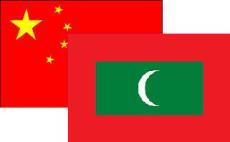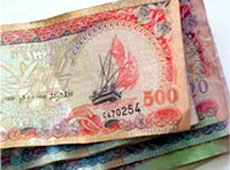President Dr Mohamed Waheed has claimed the country will be in a position to restart development projects next year as a result of his government repaying millions of US Dollars in bills incurred through the previous administration’s borrowing.
The government announced it would be suspending state-financed development projects in April after exhausting its annual budget for recurrent expenditure (including salaries, allowances and administration costs) in the first quarter of 2013.
The current government has continued throughout the last year to try and establish loan and credit facilities with foreign nations and banks for the stated purpose of “budget support”.
However, speaking during a campaign rally in Noonu Atoll this weekend, President Waheed was quoted by Sun Online as claiming that unpaid bills arising from the government of former President Mohamed Nasheed had now been settled, with no expense expected to be carried over to the 2014 budget as result.
“We have been through a very difficult time over the past two years. We could not do several things, not because we didn’t want to do them. The previous government left the country bankrupt,” he said during the rally.
“The money necessary to buy medicine for our children, the money necessary to repair the school building, the money necessary to repair the harbour of this island – all this money had to be repaid, the unpaid bills for work done by citizens, had to be paid.”
Finance Minister Abdulla Jihad and Minister of Economic Development Ahmed Mohamed were not responding to calls today, while Minivan News was awaiting a response from President Waheed’s Senior Advisor Teresa Wells at time of press.
Former administration’s borrowings
Ahmed Nazim, head of the Parliamentary Financial Committee and MP for the government-aligned Progressive Party of Maldives (PPM), said that former President Nasheed has undertaken “short-term borrowings” during his time in office.
He added that this borrowing included “US$200 million bond” sold to the Indian government with a maturity of one year that was later extended to 24 months.
Nasheed controversially resigned from office on February 7, 2012, following a mutiny by sections of the police and military.
Following the change in government, Nazim said that the Waheed administration had paid US$100 million and “settled the full payment” after Indian authorities requested the country be reimbursed by February 2013.
“Since this was a substantial component of the total foreign debt, [foreign borrowing] has come down because of this,” he said.
Asked whether the committee believed President Waheed had managed to reduce total state borrowing and spending since coming to power, Nazim said he would respond by tomorrow ( August 18 ) after having time to study relevant statistics.
In 2012, President Waheed reportedly said he would not resort to borrowing from foreign governments in order to finance government activities.
However, the government has since sought a number of foreign loans to supplement the state budget.
Earlier this month, the state requested parliament approve a US$29.4 million loan from the Bank of Ceylon to finance the 2013 budget approved by parliament.
In July, the President’s Office confirmed discussions had been held with Saudi Arabia, seeking a long-term, low interest credit facility of US$300 million to help overcome “fiscal problems” facing the nation.
Supplementary finance plans
Finance Minister Jihad claimed back in December 2012 that the MVR 15.3 billion (US$992 million) state budget approved by parliament might not last until the end of 2013 – requiring supplementary finance for the state.
In April 2013, Jihad sought authorisation from parliament to divert MVR 650 million (US$42 million) allocated for infrastructure projects in the budget to cover recurrent expenditures.
Jihad warned that government offices and independent institutions might be unable to pay salaries or electricity and phone bills if funds were not transferred from the MVR 1.8 billion (US$117 million) Public Sector Investment Programme (PSIP).
“Reckless financial management”: MDP
In July, Maldivian Democratic Party (MDP) MP and Spokesperson Hamid Abdul Ghafoor said that the heavily partisan parliament now effectively controlled state finances as a result of former opposition politicians – now part of President Waheed’s government – imposing tighter spending restrictions on former President Mohamed Nasheed’s administration.
The opposition party also accused the current government of reckless financial management, pointing to a potential US$1.4 billion compensation bill facing the state after it decided last year to abruptly terminate a US$511 million airport development contract agreed with infrastructure group GMR.
 In September 2012, President Waheed told
In September 2012, President Waheed told  electricity and phone bills if funds were not transferred from the MVR 1.8 billion (US$117 million) Public Sector Investment Programme (PSIP).
electricity and phone bills if funds were not transferred from the MVR 1.8 billion (US$117 million) Public Sector Investment Programme (PSIP).